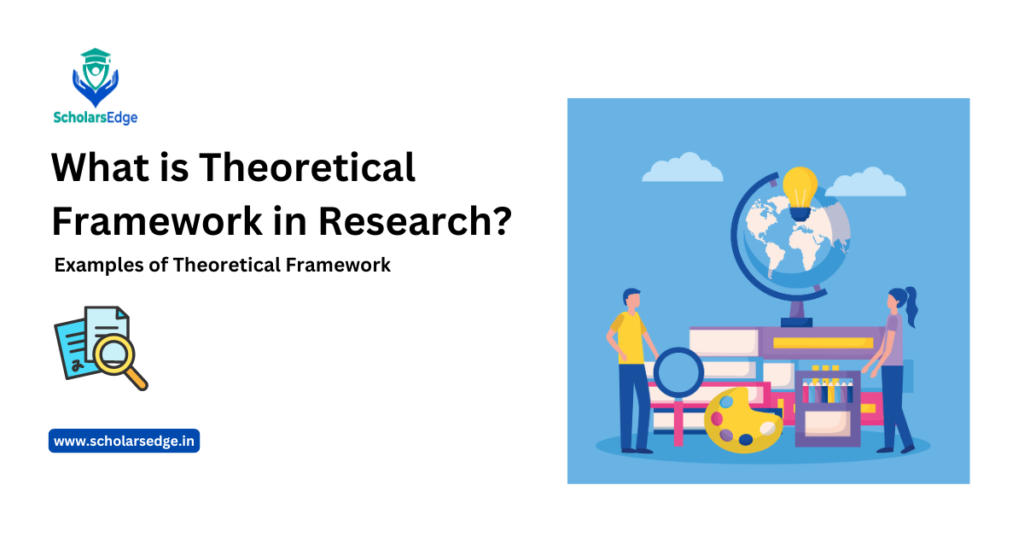
What is theoretical framework?
A theoretical framework is the foundation for a study. It specifies the key variables that influence the phenomena of interest (what we want the research to explain, describe, predict, or understand). Frameworks try to define phenomena of interest, whereas theories aim to explain or predict them.
Academic supervisors first look for a theoretical framework in research manuscripts. Even a brilliantly written dissertation may be rejected without one.
How to Make a Theoretical Framework?
A theoretical framework connects the research subject with the theory and guides further actions such as developing the literature review, framing research questions, and data collection.
The Making of Theoretical Framework:
- Postulate your research objectives.
- Specify the prominent variables in the study
- Review the literature using keywords that are recognised as prominent variables
- Make a note of the theories that have these keywords or variables
- Analyse the selected theories, taking into consideration the objectives of your study and the identified key variables
- Ensure that the framework corresponds to the objectives, key research question, problem statement, data analysis, methodology, and probable conclusion of your study.
- Choose the final framework and start developing.
Structure and writing style for Theoretical Framework
There are no fixed rules to structure the theoretical framework. However, it is best to check with your institution for formatting guidelines. A clear and logical structure is fundamental, and a few ways to do it are:
- Draw on the queries in your study, structuring each section around a key concept or a question.
- Organise by date
- Organize by theory cluster.
When writing a theoretical framework, a significant parameter is to state the key concepts and show your understanding of theoretical thoughts relevant to the existing literature, your problem statement, and your research questions.
If the theoretical framework is rooted in a particular theory, then you must test the relevance of an existing theory related to specific issues, events, or phenomena. The structure breaks down the topic into two factors and simplifies the concept that, include:
1. What is the research query/problem?
2. Why the proposed approach is a feasible solution?
Reviewing the course readings, literature, and research gaps can yield answers to these questions. Thus, a complete structure of the theoretical framework can be arrived at only after a thorough literature review.
Writing the theoretical framework
- Clearly describe the models, concepts, and theories that underpin the research study.
- As there can be various theories, models, or concepts to develop a framework, it is crucial to position the theoretical framework within a broader perspective of related concepts, models, or theories. Note why your chosen theory is appropriate.
- Use present tense to write about theory.
- Make the theoretical assumptions explicitly.
Examples of theoretical framework in research
Example 1:
A company’s profitability and sales are constantly declining. Poor services are attributed to declining profitability, leading to higher customer dissatisfaction. Thus, customer loyalty has hit a bottom. The management is planning to focus on improving customer loyalty and satisfaction.
- Objective – Provide better services to clients to improve customer satisfaction and loyalty.
- Research Problem – constant reduction in profitability and sales
- Research Question – How customer satisfaction can increase company’s profitability and sales?
- Sub-Questions – Is there a relation between sales and customer loyalty? What are the factors that impact the satisfaction level of customers?
The theoretical framework must focus on all the important concepts in the problem, such as customer satisfaction, profitability, loyalty, and sales.
Example 2:
An insurance company has a problem cross-selling products. According to the sales department, most customers have only one policy, even though the company offers almost ten unique policies. Now, the company wants the customers to invest in more than one policy as many purchase policies from various companies.
- Objective – Selling multiple insurance products to the company’s existing customers.
- Research Problem – Customers buy additional policies from various companies.
- Research Question – How to improve customer awareness to increase product cross-selling?
- Sub-Questions – Is there a connection between sales and product awareness? What factors control product awareness?
The main focus of this research study is ‘Product Awareness.’ The theoretical framework must assess this concept, research previous literature available on this topic, and suggest theories that confer the connection between awareness about insurance products and sales improvement of other products.
Importance of theoretical framework
The theoretical framework comprises concepts, definitions, and existing theories/theories used in the study. It demonstrates an understanding of concepts and theories applicable to the research paper’s subject, which will, in turn, connect it to the broader fields of knowledge.
Before we understand the importance of theoretical framework, it is relevant to know a few terms:
Framework: A framework provides essential support for developing the aspects of research over it. Creating a framework will improve investigations, and one can arrive at a specific stand (against or for a phenomenon).
Theory: Theory is one of the crucial parameters of research, as it gives direction and confirms or disapproves a phenomenon. It helps to decipher things as they are and the basis of specific actions.
Research: The scientific method of carefully assessing a study on a specific concern or problem is called Research. It is a building block of social advancement and depends on varied perspectives.
The theoretical framework is a crucial part of any research manuscript and must be presented in the first section of a dissertation.
Importance of Theory:
- Theoretical frameworks provide a blueprint for the research. It is a structure that supports and holds the theory of the study.
- It presents the problem being researched, establishes the significance and purpose of the study, and validates how the study integrates with existing knowledge and theory.
- It strengthens the study through:
- An explicit statement of assumptions that allows readers to assess them disparagingly.
- A study’s theoretical assumptions allow it to address queries such as how and why. They allow it to move from describing an observed phenomenon to taking a broad view of various facets of the phenomenon.
- The theoretical frameworks also identify the limits of generalisations and specify the key variables that impact a phenomenon.
- It focuses on a variable, thereby limiting the scope of the related data. It states the route the researcher must take in interpreting and analysing the data collection.
- validation of theoretical assumptions simplifies understanding variables and concepts, thereby building new knowledge.
Benefits of a Theoretical Framework
- The organised approach of the theoretical framework helps researchers structure their views comprehensibly.
- Gaps in knowledge are easy to identify, as the framework highlights areas that require further research.
- The systematic approach to study not only improves the quality of research but also increases the possibility of producing reliable and valid results.
- A theoretical framework clarifies the researcher’s work, helping him focus on relevant data. This significantly improves research efficiency.
- The conceptual framework provides a basis for researchers to compare their findings and results with other studies in the field, thereby offering an opportunity to exchange ideas and develop new knowledge.
Conclusion
The theoretical framework is a crucial aspect of any research as it helps researchers explain the implied theory more clearly and precisely. It also allows researchers to understand the limitations and alternate theories that challenge their standpoint. The framework shapes their thoughts, guides their study, and makes sense of their results and findings.
FAQ on Theoretical Framework in Research
What are the four types of theoretical frameworks?
Theoretical frameworks allow the researcher to investigate a topic through a particular perspective and these are:
- Psychological theories
- Organizational theories
- Social theories
- Economic theories
How many theories are there in theoretical framework?
A theoretical framework can have any number of theories, depending on various factors such as the research subject, complexity, and discipline. It is recommended to keep it simple. A more significant number of theories means you will have to define each theory, relate it to your research, and discuss it in relation to your investigation. This could be quite a challenge for a beginner.
Can I use multiple theoretical frameworks in a single study?
Including more than one theory in your theoretical frameworks is absolutely fine. However, multiple theories create unnecessary work, and you may be unable to frame your study effectively. At the end of the study, you must discuss which of the proposed theories agreed with the findings and how. There are a few pros to using multiple theories as well. It helps to overcome the limitations of a single theory. Multiple theoretical frameworks allow comparison that provides a refined definition of phenomena as it draws various study perspectives.
